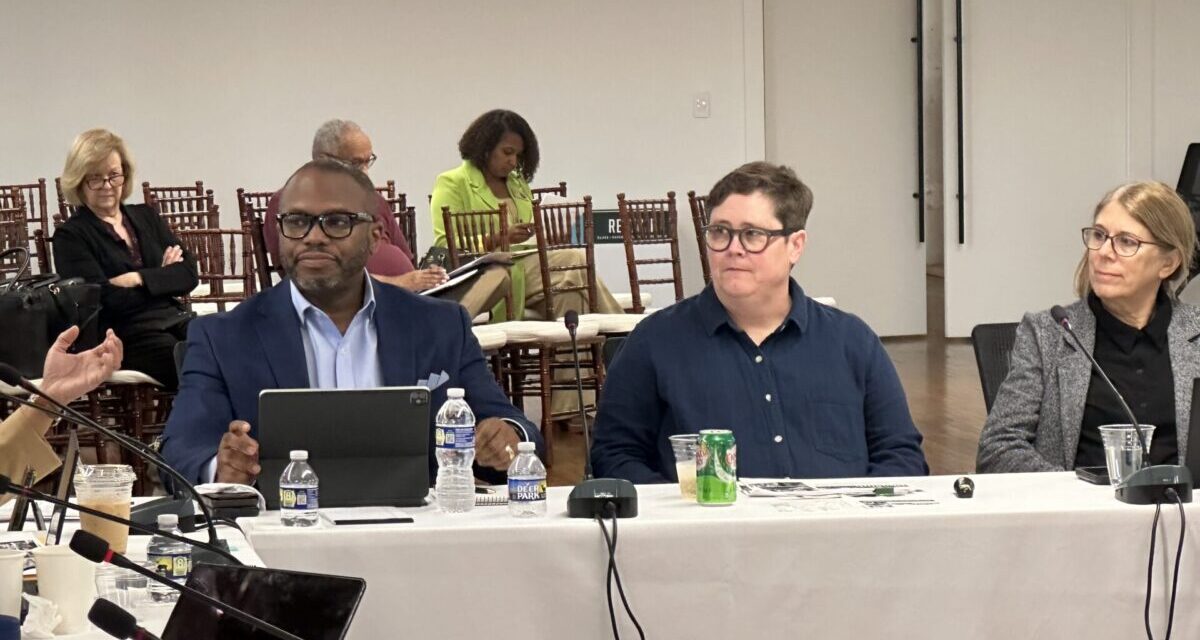The Guilford County Board of Commissioners couldn’t settle the problem of homelessness in one day, but that didn’t stop the board from bringing together a lot of key stakeholders the afternoon of Thursday, March 7 and having an in-depth discussion about the problem as well as exploring what can be done about it.
City of High Point Director of Community Development and Housing Nena Wilson spoke to the group about the issue in her city.
She said affordable housing in High Point was currently a real challenge and added that there wasn’t much development in the core city, where there were aging and dilapidated houses – though, she added, over the past decade there have been efforts to revitalize the core.
In other parts of the city as well there was a shortage of livable, affordable housing, she noted.
Wilson also said that, when you look at available housing in High Point, the average price of a house is $247,000 – which is out of the reach of many people to buy or rent.
Wilson said the city has been partnering with some non-profits to fight homelessness.
“Affordability is a big issue,” she told the commissioners, adding, “Preserving older homes – that is certainly an issue.”
City of Greensboro Housing and Neighborhood Development Director Michelle Kennedy spoke on the situation in Greensboro.
She said that, in January, $3.5 million dollars of non-city money was invested in addressing the problem, with a focus on helping those who are at the 60 percent medium income level and below.
“Affordability is out of reach right now,” she said, adding, “If traditional models were working well, we wouldn’t be in this situation today.”
All the new economic development projects in the area are putting pressure on the housing market in general and that’s showing up in lower cost housing as well.
“We can’t build them fast enough,” Kennedy said.
And when affordable housing does come available, she said, often wealthier people who are worried about the economy “shift down” and buy those houses.
“People aren’t shifting up,” she said. “They are shifting down.”
Another concern expressed by affordable housing advocates is that developers who do build that type of housing often choose to do so in competing markets like Charlotte and Raleigh.
There was general agreement that there is no single solution.
“The short issue is there is no one answer,” Kennedy said, adding that a “kitchen sink approach” is what’s needed.
Some possible solutions discussed are cities donating land to developers who are willing to build affordable homes, incentivizing developers in other ways to build more affordable housing, subsidizing rents, and or subsidizing the incomes of the poor.


“Help the poor, won’t you help poor me?”
To Ms. Kennedy, maybe we buy a few more rundown motels and let them sit empty for 3+ years. Great plan. How has it worked.
In other words, increased taxes which will be wasted. Greensboro and Guilford County can do that very well.
The problem is DRUGS, not the homeless. Problems created by our local & national socialist governments.
Our govt wants everyone (but those well-placed) to be poor, so that we are dependent upon the government.
Big Brother is here. You saw what it cost to get rid of Hitler & Stalin (among MANY others in history). What do you think it would take to rid North Korea of their govt? The people of China still have the yoke of a socialist government. You see how the State controls the people.
The state controls people by offering to “donate land” where developers build houses that people then buy or rent so they never own the land they live on. Kennedy’s options are all ones of communist/socialist government. The solutions are ones of a free economy capitalist government – lower taxes, fewer fees and regulations, individual homeownership (including land), lower living costs, individual responsibility, lower crime through prosecution and punishment, mental health treatment, etc, etc.
Summerfield would be an excellent area to build, homeless shelters, and low income government housing, and also housing for the migrants.
There is a lot of vacant land owned Mr. couch, and he is getting ready to get it all rezoned so let’s reach out to him hope that he’ll help out the homeless and the migrants.
Let’s start with this question, why are the illegal invaders given priority over our own citizens for welfare , housing, medical benefits? Let’s get the rest of the story related to these Catholic and Lutheran NGO’s and others that are facilitating this BS. Wake up people!!!